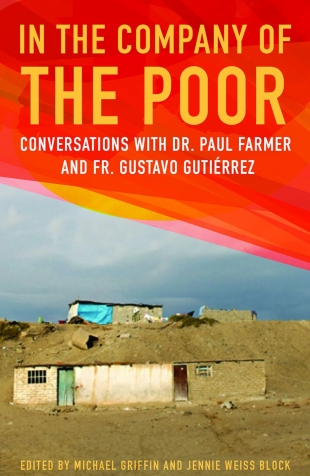"Both Gutierrez and Farmer invite us into their work — in theology and global health — and offer a model of how to make solidarity operational: accompaniment.
" 'This attitude of God must serve as a model for the people of God,' Gutierrez writes. 'As Micah puts it, "He has showed you, O man, what is good; and what does the Lord require of you but to do justice, and to love kindness, and to walk humbly with your God?" (6:8).' There is an urgency to the message — walk humbly together, with God and with one another, in search of justice and mercy.
" ' "Accompaniment" is an elastic term,' Fanner writes in Foreign Affairs. 'It has a basic, everyday meaning. To accompany someone is to go somewhere with him or her, to break bread together, to be present on a journey with a beginning and an end. There's an element of mystery, of openness, of trust, in accompaniment. The companion, the accompagnateur, says: "I'll go with you and support you on your journey wherever it leads; I'll share your fate for a while. And by 'a while,' I don't mean a little while." Accompaniment is about sticking with a task until it's deemed completed, not by the accompagnateur but by the person being accompanied.'
"Yet accompaniment is not simply walking together. It requires recognizing real-world complexities, acknowledging the asymmetries of power and privilege, and being willing to address these while walking together. There is something fundamentally but beautifully radical in this idea. In a society so focused on individual attributes and achievement, this simple concept of walking beside another, humbly and ever toward justice, could change the world. In the words of Mother Teresa, 'The problem with the world is that we draw the circle of our family too small.' This dialogue is about drawing ever larger circles, encompassing us in a radically wider conception of family, from Peru to Haiti to Rwanda and back to the United States, on college campuses and inner cities, in local parishes and in medical schools.
"This same accompaniment concept can also be applied to the relationships between nations. What is needed, Farmer argues, is a new social movement that changes the way countries and institutions have traditionally thought about development aid — moving, in Farmer's words, 'from Aid to Accompaniment.'
"Envisioning international development aid as 'accompaniment' — that we're in this together, and not just for a little while, but for the long run — would call us to identify and support institutions that truly represent the poor; partner with public institutions rather than 'go it alone'; make job creation a benchmark of success; invest directly in the poor themselves; and establish learning loops that put in practice what we learn through this accompaniment process. 'True accompaniment does not privilege technical expertise above solidarity, compassion, and a willingness to tackle what may seem insuperable challenges,' writes Farmer. 'It requires cooperation, openness, and humility; this concept may, I hope, infuse new vitality into development work.
"Gutierrez describes Jesus in the Acts of the Apostles passing through this world 'doing good.' 'Jesus not only healed the sick, Jesus allowed the sick to take part of their own healing. Very often Jesus told them: "your faith had saved you." Once healed, they became, also, agents of healing, and an invitation to be agents of their own destiny.'
"In Peru, accompaniment in practice is a community health worker who lives in a shantytown outside of Lima, daily climbing up and down the dusty hills of a settlement. During her home visits, she not only watches the person she is accompanying take the necessary tuberculosis medication and discusses basic health care; she also probably discusses daily life, ranging from counseling what to do with a misbehaving teenager (be patient) and what to do about an errant husband (don't be too patient). She visits every single day, because if you're a TB patient, it's critical that you don't miss a treatment. Many community health workers are former TB patients themselves, and for some, it is their first-ever paid job. Today nearly two-thirds of 13,000 people working for PIH around the globe are community health workers — accompagnateurs. Poor people who now have jobs, which in and of itself is transformative, and they in turn, through their work, transform the lives of others.
"Accompaniment provides not only a reimagination for those who work on and think about global health but also an emerging framework that can be applied, to use Gutierrez's term, in mil maneras — a thousand ways — from housing to education, economics to environmental policy, food security to peace promotion.
"Accompaniment flips the impulse of 'how do we help them?' into an assertion — 'we're in this together.' We are connected, tied, and bound together. We need to walk together and learn together, and maybe, together, we can envision and create better, more equitable tomorrows, both for the big issues 'over there' and also in our daily lives, loving our neighbors — that is, everyone — as we love ourselves.
"Although one aspiration of this book is to make more visible the linkages between liberation theology and global health, another is to expand the dialogue outward, encouraging us to think that this is not just a dialogue on liberation theology and global health. Here within are the seeds of a new social movement centered on accompaniment. In this way, global health can be seen as one inspiring path — one of the thousand ways — to make one's preferential option for the poor a journey of walking together."
